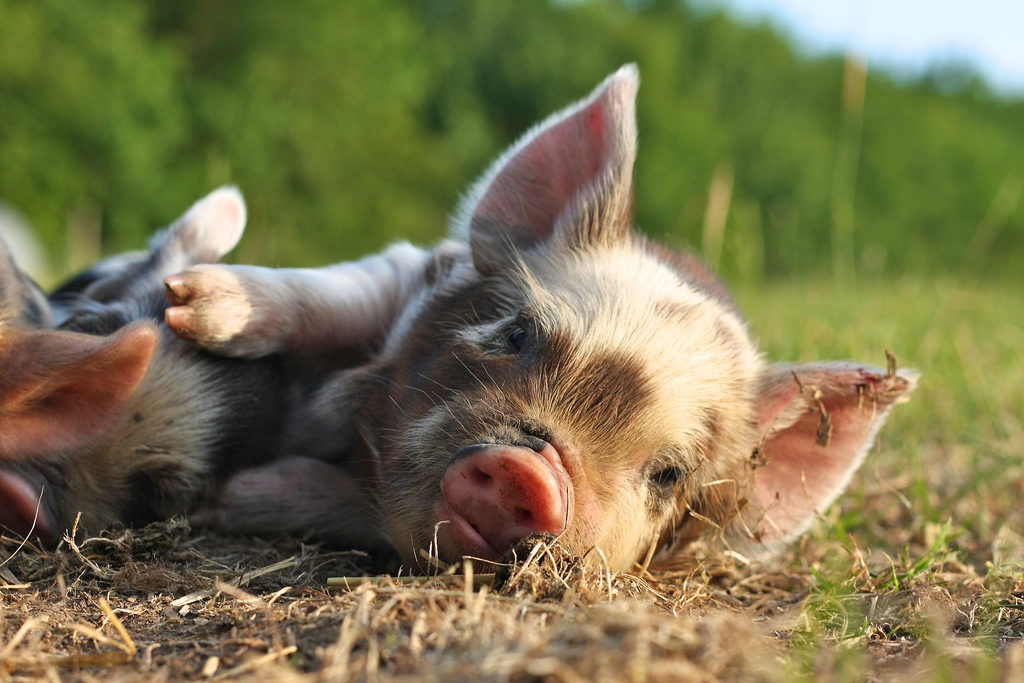Inspirando: allevatore di suini diventa vegano e ora coltiva verdure
Sempre più agricoltori vedono opportunità nella coltivazione vegetale, senza l’uso di animali. Uno degli esempi più recenti è la storia del Svedese Gustaf Soderfeldt.

Nel 2006, Soderfeldt ha iniziato una piccola fattoria di suini. Riteneva terribile il modo in cui gli animali venissero trattati negli allevamenti industriali di bestiame e volevano affrontarlo in modo diverso: su piccola scala, rispettando gli animali. Il numero di clienti che volevano la sua “carne amichevole” è cresciuto in modo significativo e la società è stata un successo. Ma Soderfeldt capì che il denaro stava diventando sempre più importante. Soderfeldt raccontò a un giornale svedese:
“I nostri clienti amano sentire che i nostri animali hanno avuto una “buona vita” e quanto “amichevole per gli animali” era la nostra carne. Ma non volevano sentire niente dal lato terribile. Per esempio, non potevo dire a loro che una scrofa affatto non vuole essere separata dai suoi maialini e che i maiali gridavano dalla paura quando furono caricati sul camion che li avrebbe portati al macello. L’unico modo per tenermi i miei clienti era nascondere la verità e la mia vita d’allevatore di maiali si sentiva meno giusto giorno dopo giorno
La maggior parte dei nostri clienti compravo carne da noi per mettersi in pace con la loro coscienza. Le persone non vogliono ammettere che sostengono un settore che tratta gli animali in un modo terribile. Pertanto, acquistano “carne amichevole agli animali”. Ho trovato sempre più difficile essere un cartello pubblicitario per l’industria della carne.”
Il veganismo è il futuro dell’agricoltura
Quando Soderfeldt è entrato in contatto con il veganismo tramite YouTube, ha capito che “carne amichevole agli animali” non esiste affatto. Ha fatto il click quattro anni fa e ha capito che i vegani volevano la stessa cosa di lui: che gli animali hanno una buona vita. Dopo tutto, questa era l’intenzione originale della sua fattoria. Ma i vegani vanno un passo avanti: se ti interessano veramente gli animali, non li uccidi affatto. Anche Soderfeldt pensava che le persone dovevano mangiare carne per essere sano, ma imparato che non è vero.
Lui e sua moglie sono diventati vegani, hanno smesso di tenere animali e passati alla coltivazione vegetale senza l’uso di prodotti animali come la farina di sangue, farina osseo o concime d’origine animale. Il cambiamento non era facile e hanno perso quasi tutti i loro clienti. Ma dopo quattro anni la sua azienda si è ripresa e coltiva, tra le altre cose pomodori, patate, fagioli, piselli, lattuga, carote, cipolle, cavoli e fiori. Li vendono attraverso vari mercati agricoli e attraverso abbonamenti vegetali.
Soderfeldt è convinto che il veganismo sia il futuro dell’agricoltura ed è “pacifico, più sano, più efficiente, crea meno spreco e più rispettoso dell’ambiente” rispetto all’allevamento di animali.
Increasingly more farmers see opportunities in vegetable agriculture, without the use of animals. One of the most recent examples is the story of the Swedish Gustaf Soderfeldt.

In 2006, Soderfeldt set up a small-scale pig farm. He believed that the way animals were treated in industrial animal farming was horrific and he wanted to do it differently: small-scale, with respect for animals. The number of customers that wanted his ‘animal-friendly’ meat grew considerably and the company was a great success. But Soderfeldt realised that it increasingly came down to money. Soderfeldt told a Swedish newspaper:
“Our customers liked to hear that our animals had lived a ‘good life’ and how ‘animal-friendly’ our meat was. But they didn’t want to hear about the bad side. For example, I couldn’t tell them that a sow didn’t want to be separated from her piglets at all and that the pigs screamed with fear when they were loaded onto the truck to bring them to the slaughterhouse. The only way to keep my customers was to conceal the truth and my life as a pig farmer felt less honest every day.
Most of our customers bought their meat with us to ease their conscience. People don’t want to admit that they support an industry that treats animals horribly. That’s why they buy so-called ‘animal-friendly meat’. It became more and more difficult for me to promote the meat industry.”
Veganism is the future of agriculture
When Soderfeldt came into contact with veganism via YouTube he realised that ‘animal-friendly’ meat doesn’t exist at all. He copped on four years ago and realised that vegans wanted in fact the same thing as he did: animals living a good life. After all, that was originally the concept for his farm. But vegans go even one step further in this: if you really care for animals you won’t kill them at all. Soderfeld also used to think that people needed to eat meat to stay healthy but he soon learned that that wasn’t true.
He and his wife became vegans, stopped keeping animals and changed to growing vegetables, without the use of animal products such as blood meal, bone meal or animal manure. The transition was not easy and they lost almost all of their customers. But after four years the company is back on its feet and they now grow tomatoes, potatoes, beans, peas, lettuce, carrots, onions, cabbages and flowers among others. The sell them on various farmer markets and via vegetable subscriptions.
Soderfeldt is convinced that veganism is the future of agriculture and that it is ‘peaceful, healthier, more efficient, less wasteful and more environment-friendly’ than animal agriculture.